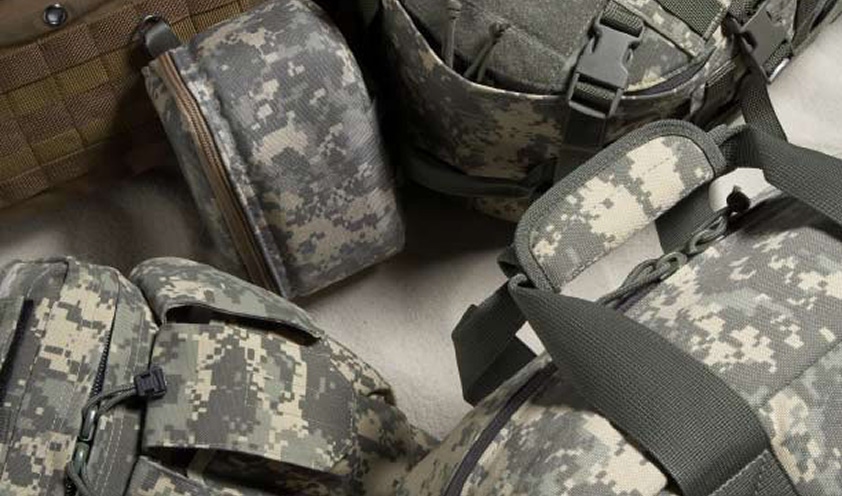Filed Under:
Industry
Published on
November 12, 2025

When deployment windows are measured in hours, non-compliant gear can cost contracts and compromise missions. The term “Berry compliant” is more than just a procurement checkbox; it is a legal mandate from the Department of Defense (DoD) requiring that textiles, specialty metals, and other key components be 100% sourced and manufactured within the United States.
For program managers and engineers specifying defense-grade protective cases, a misunderstanding of this regulation can lead to significant project delays, bid protests, and supply chain vulnerabilities.
As America’s largest custom case manufacturer, Royal Case understands these high stakes. This article breaks down the essentials of Berry compliance to ensure your equipment meets every requirement. We will cover:
The Berry Amendment Restrictions, enacted in 1941, require the Department of Defense to procure certain products, such as food, specialty metals, and made-up textiles, with 100% U.S. content and labor.
It is subsequently codified in U.S. law under 10 U.S.C. 2533a and is implemented in federal procurement through the Defense Federal Acquisition Regulation Supplement (DFARS) clause 225.7002. This law establishes the core mandate: for DoD contracts, covered items must be grown, reprocessed, reused, or produced entirely within the United States.
This "100% domestic" rule is far stricter than other federal sourcing regulations. Recent legislation, including the FY 2022 National Defense Authorization Act (NDAA), has continued to strengthen these domestic source restrictions, with funds appropriated in each fiscal year to support enforcement. The amendments have been subsequently codified to reflect evolving defense procurement needs.
For manufacturers of protective cases, this means every fiber, fabric, and specialty metal must have a verifiable U.S. origin and meet strict manufacturing standards for complete Berry Amendment compliance.
Statutory Language Snapshot (DFARS 225.7002): "Except as provided in 225.7002-2, do not acquire... any of the following items, either as end products or components, unless the items have been grown, reprocessed, reused, or produced in the United States."

Translating the legal text of the Berry Amendment into practical manufacturing reality requires a rigorous, end-to-end system of traceability.
For defense-grade protective cases, this means that every raw material, from the nylon fabric and webbing down to the thread and zippers, must be sourced in sufficient quantity from a domestic clothing production base.
This also applies to the chemical precursors used in the production of raw fibers for textiles. For example, a case using MIL-DTL-32439 Type IV nylon must be built from fabric woven in the U.S. from U.S.-made yarn.
Proving compliance is a documentation-intensive process. It is not enough to simply state that a product is compliant; manufacturers must provide a clear and auditable trail from raw material to finished good.
This often involves DoD plant audits and requires meticulous record-keeping for every component lot, especially when funds appropriated in the current fiscal year are being utilized for procurement.
Procurement teams frequently navigate three different domestic sourcing restrictions, and understanding their distinctions is critical. While they share similar goals, their applications, thresholds, and exceptions vary significantly.
The Berry Amendment Restriction is the most stringent of the three, specifically targeting DoD contracts and leaving no room for the "substantial transformation" loopholes found in other acts.
For protective cases used in DoD applications, the Berry Amendment's strict 100% U.S. origin rule for textile components supersedes the more flexible cost-based tests of the BAA and TAA. This applies to other made-up textiles and all materials used in Berry Compliant products for DoD contracts, which have been subsequently codified in federal regulations.

For engineering and procurement teams, ensuring Berry-compliant products is a critical risk-mitigation strategy. DoD contracts, Department of Homeland Security (DHS), and certain GSA Schedules often contain DFARS clauses that mandate compliance.
Failure to meet these standards can result in rejected bids, costly contract termination, and even legal penalties. Adhering to the standard significantly reduces the likelihood of bid protests, leading to smoother project execution.
Beyond contractual obligations, sourcing domestically bolsters operational security by shortening supply chains and supporting the U.S. defense industrial base. The soft case manufacturing process, from design to production, must incorporate these domestic sourcing requirements at every stage.
The financial scale of this compliance is also significant. In Fiscal Year 2021, the Department of Defense's procurement of made-up textile and apparel articles amounted to $2.3 billion, while expenditures specific to clothing totaled $1.7 billion.
While domestic inputs can carry a cost premium, the benefits of supply chain stability and guaranteed contract eligibility often outweigh the added expense.
Specifying the right materials is the first step toward a compliant final product. Engineers must demand comprehensive documentation for every textile-based component.
Sourcing pitfalls, such as using fabrics woven in the U.S. but finished or dyed in an international facility, can render an entire product line non-compliant. Here is a checklist of common materials and their required documentation:

At Royal Case, we have built our processes around the stringent demands of military and defense procurement. Our commitment to Berry compliance is embedded in every stage of our workflow, from initial consultation to final delivery. This is how we provide absolute assurance to our partners.
Our dedicated U.S. sourcing team ensures every component meets DFARS requirements. All manufacturing and assembly takes place domestically for Berry-compliant products, offering unparalleled traceability.
As the largest U.S. manufacturer of military wholesale cases, we have a proven track record of scaling to meet high-volume demands. Our expertise covers a vast array of protective solutions, including the custom soft case, custom hard cases, custom aluminum cases, the custom EVA case, and durable silicone cases.
Choosing a manufacturing partner with deep expertise in Berry compliance provides more than just a product; it delivers confidence and operational advantage. Here’s what sets Royal Case apart:
Now you have the answer to the question: what is Berry Compliant? For mission-critical applications, Berry compliance isn’t optional; it’s mission insurance. It guarantees a secure, domestic supply chain and ensures that the gear protecting sensitive equipment is as reliable as the personnel who use it. Understanding the nuances of this regulation is the key to successful and timely defense procurement.
Don't leave compliance to chance. If you're developing specs for defense-grade protective cases, ensure your project is built on a compliant foundation from day one.
Don't risk contract rejection. Partner with America's largest custom case manufacturer for guaranteed DFARS compliance. Schedule your compliance audit with us and secure your mission today.